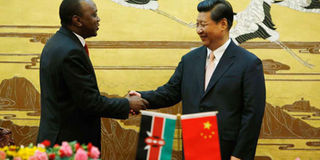Sino-Kenya ties the perfect test for Chinese forays into Africa

Kenya's President Uhuru Kenyatta (left) and his Chinese counterpart Xi Jinping shake hands during a deal-making ceremony at the Great Hall of the People in Beijing on August 21, 2013. Bilateral cooperation has been significantly deepened by good relations between the two nations. PHOTO | AFP
What you need to know:
- The momentum of bilateral party relations has been fast — explaining why CPC has established relations with 81 African political parties, both in and out of power.
- High-ranking CPC leaders, including from the 16th and the 17th central politburo standing committees, have led delegations on frequent visits to Africa.
- China’s other strategy in Africa has been through investment and trade. Chinese companies continue to invest in Kenya, even as leading business people from China visit to explore.
That, of late, the political engagement between China and Kenya appears to intensify beyond the usual social, economic and financial partnership is clear. This, perhaps, explains why a powerful delegation of China’s ruling political party led by Wang Yang, chairman of the Chinese People's Political Consultative Conference (CPPCC), is in Kenya for what has been billed a mission to deepen mutual cooperation and bilateral relations.
When China’s President Xi Jinping visited Kenya last year, he signed an agreement with President Uhuru Kenyatta to upgrade the Sino-Kenya relations to the Comprehensive Strategic Cooperative Partnership (CSCP). It is understood that the current visit is part of the Asian country’s political charm offensive on Africa that began last Monday and includes the Republic of Congo and Uganda.
Last month, Huang Kunming, member of the political bureau of the Communist Party of China (CPC) central committee, hosted a delegation from the South African Communist Party (SACP) led by its general secretary, Blade Nzimande.
BILATERAL RELATIONS
Early this year, Wang Xiaohui, executive vice-minister of the Communist Party of China Central Committee’s publicity department, led a delegation to Kenya and met President Kenyatta as well as officials of the ruling Jubilee Party.
And tellingly, China’s strategy of collaboration through political parties which began in the 1950s seems to be paying off as the Asian giant's influence seems to grow by the day. For example, relations between the CPC and South Africa’s ruling party, the African National Congress, are typical of those between Chinese and African political parties.
In this new-type Sino-African strategic partnership, party-to-party exchanges and training has been key. Jubilee took key officials for training in China on running the party before last year’s general election.
The momentum of bilateral party relations has been fast — explaining why CPC has established relations with 81 African political parties, both in and out of power.
INDUSTRIAL PARK
High-ranking CPC leaders, including from the 16th and the 17th central politburo standing committees, have led delegations on frequent visits to Africa. Standing committee member Li Changchun made three visits to Africa in 2005, 2008 and 2011. He visited Sudan, Namibia, Tanzania, South Africa, Algeria, Mauritania, Morocco, Tunisia, Mozambique and Kenya.
CPC has kept regular contacts with more than 400 political parties and organisations in about 160 countries and regions.
China’s other strategy in Africa has been through investment and trade. Chinese companies continue to invest in Kenya, even as leading business people from China visit to explore. Chinese firm Guangdong New South Group Limited, for example, signed a deal with the Kenyan government to build a $1.9 billion industrial park in Eldoret.
SCHOLARSHIPS
Jack Ma, co-founder of the behemoth Alibaba, recently delivered a public lecture at the University of Nairobi on how to build successful business empires from scratch. The founder and executive chairman of Chinese e-commerce led a delegation of 38 Chinese billionaire business people, among them Internet tycoon Bob Xu, Alibaba’s founding partner Lucy Peng, founder and chairman of Mengniu Dairy Niu Gensheng and real estate tycoon Huang Youlong.
Ma, a special adviser for youth entrepreneurship and small businesses for the United Nations Conference on Trade and Development (Unctad), rooted for e-commerce to bolster investment and trade in developing countries.
Beijing is taking thousands of African leaders, bureaucrats, students and business people to China. It has increased scholarships for Kenyan students in China while many local universities are teaching Chinese.
POLITICAL TRAINING
These trips are part of a strategy to solidify political and business ties between China and its African partners. In the next five years, CPC plans to invite 15,000 members of foreign political parties to China for exchanges. The end result is having partners in Africa who are likely to be sympathetic to China and its way of doing things.
In his book, China and Africa: A Century of Engagement, former United States ambassador to Ethiopia David Shinn chronicles China’s political training for parties like Tanzania’s Chama Cha Mapinduzi, Zanu-PF of Zimbabwe and Swapo (Namibia).
The special relationship between China and Kenya seems like a perfect testing ground for future Chinese alliance-building efforts in other African countries.
Prof Mogambi is a commentator on development issues. [email protected]




